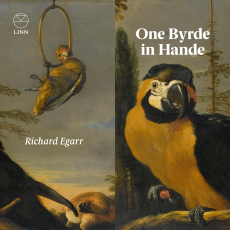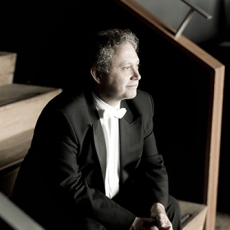Richard Egarr - One Byrde in Hande - MusicWeb International
Richard Egarr’s new release of Byrde’s keyboard music is especially welcome. There are not too many competitor recordings for most of these pieces and some of those are download only or recorded on the organ. Not that I have any objection to Byrd on the organ – in some respects I might have preferred Egarr to have given us a mixed recital on both keyboard instruments, as Davitt Moroney does on his definitive multi-CD programme (Hyperion – see below).
As it is, the nearest rival to the new release comes from Glenn Wilson, also on a copy of a Ruckers harpsichord (Naxos 8.572433 – review ). Just over half the works on each recital are common to both. Both contain some very fine playing; the Naxos offers slightly more music and at budget-price but isn’t available in anything higher than 16-bit CD quality. Another recital entitled Pescodd Time, recorded in 2005 by Bertrand Cuiller, on Alpha319, is complementary to both: it offers mostly a different selection of Byrd’s music, together with music by his contemporaries John Bull and Peter Philips, at mid-price. (Stream from Naxos Music Library from the original release, Alpha086).
Don’t expect Byrd’s keyboard music to sound thin and tinkly, especially in the hands of Richard Egarr, benefiting from being immersed in Byrd’s vocal masterpieces in Latin and English and here making his solo debut for Linn. Nor should you expect a collection of works with unpromising titles to sound dull from Egarr or Wilson, though there’s nothing here as intriguingly titled as some of his lute pieces. Or, indeed, some of his keyboard works, such as Galiardo Mistris Marye Brownlo or Have with yow to Walsinghame.
Two of the longest works on both collections (No.64 and No.65) look at first like an exercise in tonic sol fa, with the titles Ut, re, mi, fa, sol, la and Ut, mi, re. Wilson gives both of these a rather grand treatment, which suits the music well, though there’s also plenty to tap the feet to. Egarr moves both along more rapidly, yet without missing the dignity of the music. I like both interpretations, but I recommend that you sample both to see which you prefer. Naxos Music Library has the Wilson – here – and Linn offer short samples of the Egarr – here.
Both play on modern versions of Ruckers instruments and both employ quarter mean-tone temperament. Wilson’s instrument is tuned to a slightly higher pitch (415Hz) but both instruments have a rounded sound. It is, of course, possible to play the music of this period on the virginals, a more intimate sound, but I enjoyed hearing both these harpsichord recitals.
Choice between two such fine sets of performances is almost impossible. If you prefer the music to sound more dance-like, enjoy the slightly deeper sound of 393Hz, or must have Linn’s very fine 24-bit recording, the new Egarr will be mandatory. If price is more of a consideration, Wilson for around £7 on CD or around £5 as a lossless download in more than decent quality will be your better choice. What eventually persuades me to make the new recording my top recommendation is the final piece, The Bells. Was this, I wonder, Purcell’s inspiration for his ‘bell’ anthem?
For once, Egarr gives this remarkable work a little more time to develop than rival recordings, such as Davitt Moroney’s, though the difference in practice is hardly noticeable (Hyperion CDA66558 – DL Roundup October 2010 – download only, or 7-CD set CDS66551/7 – review ). I can’t pass by the Moroney performances on a variety of keyboard instruments, however, without adding my recommendation for serious students of Byrd’s music: this is a spectacular achievement and I’m sorry to see that only a few copies remain of the CD set, though it will still be available to download from hyperion-records.co.uk, complete with the massive booklet, for just £30.
If you want the full panoply of Byrd’s keyboard music, £30 is very little to lay out for the Hyperion edition. Otherwise use the criteria I set out above to choose between Egarr and Wilson for a single-CD recording. All three offer very fine performances, well recorded, especially so in the case of the new Linn in 24-bit garb.

